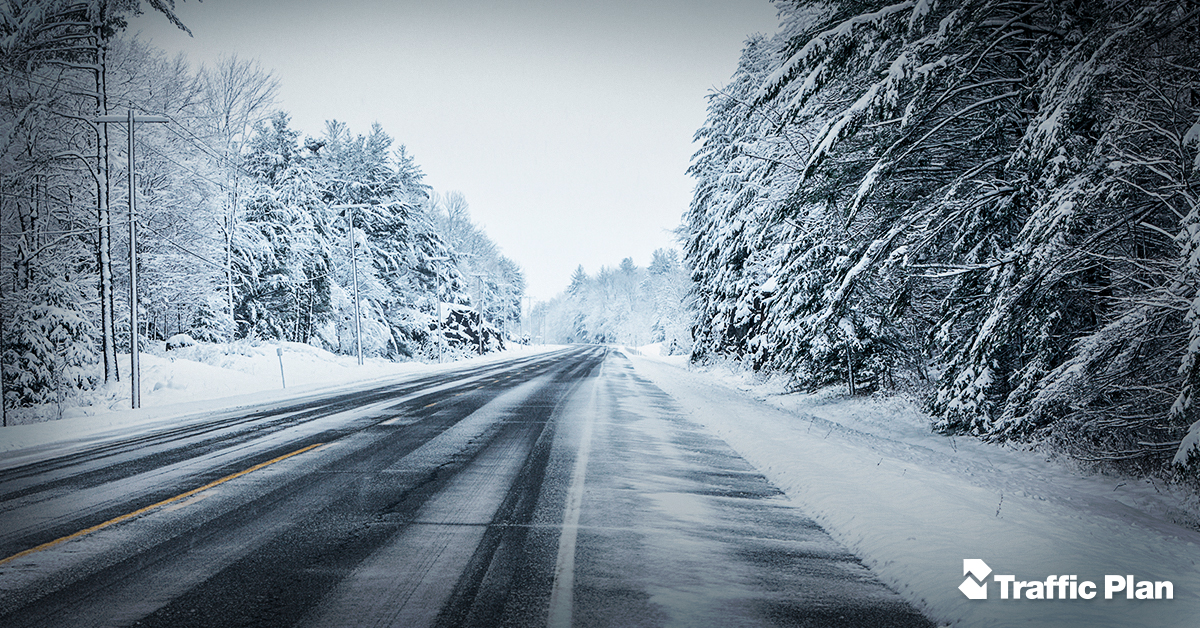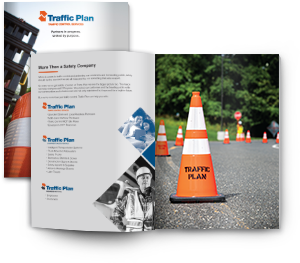
A lot of people with outdoor jobs — farmers, landscapers, home builders — typically experience some downtime once the cold weather hits. But that’s not the case for traffic control workers.
Utility companies, local municipalities, and departments of transportation need to keep things running smoothly 24/7 — even in the winter months. That means work zones and the sight of construction cones and signs are still common in our area this time of year. And the Traffic Plan team is here to support our clients’ needs and to be their partner in progress, 365 days a year.
Tips for Drivers
There’s no question that bad weather has a big impact on road safety, especially winter weather. Snow- or ice-covered roads and reduced visibility can make for treacherous driving conditions — and a greater chance for work zone accidents.
Here are some helpful reminders for keeping yourself and our work zone crews safe during wintry weather:
#1 Keep More Distance Between Vehicles
Tailgating the driver in front of you during snowy weather is a bad idea. There’s a greater chance you’ll skid if you need to step on the brakes — or worse yet, you’ll lose control of your vehicle and have a close encounter with a traffic barricade or two.
The most common type of accident in a work zone is a rear-end collision, so maintain a safe distance between you and the driver in front of you.
#2 Use Your Headlights
Always turn on your headlights when driving in wet and wintry weather. If you’re being extra cautious, especially when passing through a work zone, and driving under the recommended speed limit, turn on your four-way flashers so the drivers behind you have a helpful warning sign.
#3 Pay Attention
It should go without saying — give your undivided attention to the road at all times. When approaching a work zone, watch for construction signs and brake lights, and also be on the lookout for construction cones, traffic barricades, and of course work zone flaggers. Lane shifts might not be as visible in wintry conditions, so be extra alert for those as well.
Paying attention also means keeping your hands on the steering wheel and off the cell phone and vehicle dashboard controls. Safety first!
#4 Be Patient
Patience is one of the best virtues to have when you’re on the road in bad winter weather. Give yourself plenty of time to get from point A to point B, and stay calm. If you happen to encounter an aggressive driver on the road, don’t retaliate. Avoid eye contact, don’t honk the horn, and keep your distance from them.
Tips for Our Crew
Just like drivers, our work zone crews also need to take extra precautions when working in wintry conditions. Be extra alert while on the job site. Always survey your work site and have a possible escape route around your construction cones and traffic barricades just in case a vehicle unexpectedly heads in your direction.
Besides being extra vigilant on the job, crews should also wear appropriate clothing. What you wear is the most important thing you can do to stay warm and protect yourself from the elements.
Here are some tips for how to dress from head to toe:
#1 Layer Up
The key to staying warm in frigid temps is layering. Have a wicking layer in contact with your skin. Avoid cotton garments. Instead, choose a synthetic material for your long johns or first-layer shirt.
Your second layer should consist of a light insulating material, like a fleece shirt.
Your top layer should be the heaviest insulating layer. Wear a heavy fleece or wool sweater, and top that with a waterproof and windproof jacket.
#2 Protect Your Head and Feet
Doubling up on the socks is a good idea. Wear wool socks — and insulated and water-resistant boots are a must. Always wear a hat and gloves, as hypothermia typically starts in your hands and feet. Stay protected!
#3 Stay Fueled with Food
Eating the right types of food can help raise your body temperature and make you feel warmer in cold working conditions. Eat healthy-fat foods like avocado, cheese, nuts, and yogurt. Food that is notoriously carb-heavy — like bread, cheese, and butter — can also help keep you warm and fueled.
And don’t forget to stay hydrated with water, even though you may be less inclined to drink up in colder temps. Water will actually help your body stay warm and will help prevent dehydration.
#4 Wear Sunglasses
Sunglasses aren’t just for summer. A pair of quality sunglasses will not only help reflect the sun’s glare from the snow and give you better vision, but they will also help protect your eyes from the wind, ice, and snow.
So don’t forget — be patient and play it safe when you’re sharing the road this winter with work zones and our amazing crew members. We all thank you for it!

